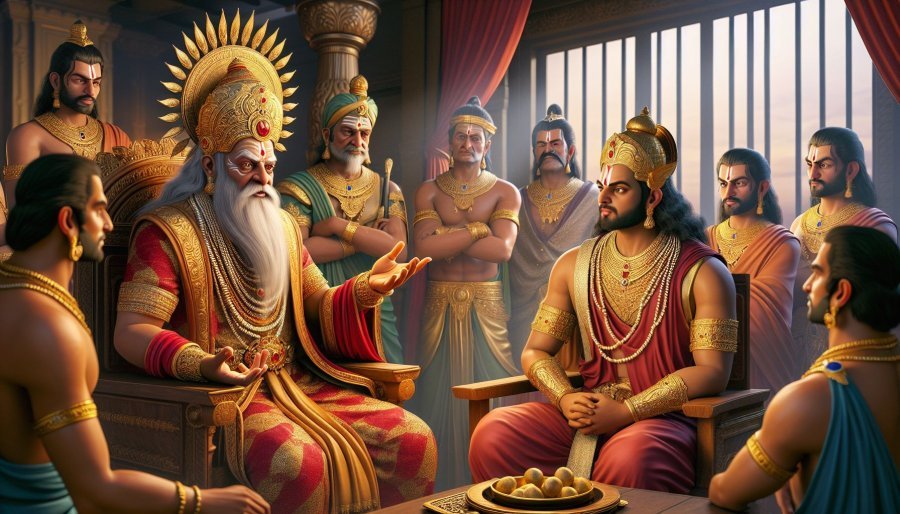Section CCV - Bhishma's Advice: Give Half the Kingdom to the Pandavas
Book index: Mahabharata (English)
This page contains a summary of the Mahabharata Section CCV including examples of moral lessons in daily life. The Maha-Bharata is one of the largest epics ever written containing roughly 100,000 Sanskrit verses. It deals with the legendary history of ancient India and contains a large number of interwoven tales.

Short summary of the chapter:
Bhishma advises Dhritarashtra against quarreling with the Pandavas, as he considers them to be like his own family. He suggests dividing the kingdom equally between the Pandavas and the Kauravas to avoid conflict. Bhishma warns Duryodhana that holding onto the kingdom by force will only bring dishonor and advises him to maintain a good reputation. He urges Duryodhana to follow the righteous path of their ancestors and points out the fortunate survival of the Pandavas after the attempt on their lives. Bhishma emphasizes the importance of reputation, stating that one's fame is what truly determines their worth and longevity. He reminds Duryodhana that as long as the virtuous Pandavas are alive, they have a rightful claim to their share of the kingdom and should be given it for the welfare of all.
Full English translation:
This page is merely a summary which is automatically generated. If you are looking for authentic sources such as the Sanskrit text or the Full English translation of Mahabharata Section CCV - Bhishma's Advice: Give Half the Kingdom to the Pandavas, have a look at the following articles:
Section CCV, online text
English translation by Kisari Mohan Ganguli.
Read this and other chapters online.
Mahabharata (English Summary)
by Kisari Mohan Ganguli | ISBN-10: 8121505933
Buy the latest edition:
FAQ of Mahabharata, Section CCV:
What was Bhishma's opinion on the quarrel with the Pandavas?
Bhishma disapproved of a quarrel with the Pandavas, urging for a peaceful resolution. He suggested giving them half the kingdom to avoid dishonor and maintain a good reputation.
Why did Bhishma urge Duryodhana to give half the kingdom to the Pandavas?
Bhishma believed it was just for the Pandavas to receive their share and avoiding conflict would benefit everyone. He emphasized the importance of upholding the Kuru race's reputation and following righteous practices.
How did Bhishma view the fate of the Pandavas and the Kuru race's reputation?
Bhishma saw the survival of the Pandavas after the fire as a sign that they deserved their rightful share. He emphasized the significance of maintaining a good reputation and virtuous practices in the Kuru race.
Daily life: Bhishma's Advice: Give Half the Kingdom to the Pandavas:
In the story, Bhishma advises Dhritarashtra to avoid conflict with the Pandavas and instead share the kingdom equally, highlighting the importance of fairness, family unity, and maintaining a good reputation. This story teaches us several valuable lessons that can be applied in our daily lives.
Firstly, we should always strive for fairness and justice in our interactions with others. Ensuring that everyone gets their fair share can prevent conflicts and help maintain harmony. Secondly, the significance of family unity and treating everyone equally is emphasized. We should cherish and protect our relationships with family members, treating each person’s needs and rights with respect and consideration.
Moreover, the story points out the critical role a good reputation plays in our lives. Maintaining our integrity and honor in the eyes of others is invaluable. Our actions should reflect virtues that uphold our name positively because, as the narrative reveals, one's lasting legacy is tied to how they are remembered by others.
Lastly, Bhishma's advice to avoid unnecessary conflicts and seek mutual agreements where possible teaches us the importance of compromise and diplomacy in resolving disputes. Seeking the welfare of everyone involved and making decisions that benefit all can lead to more peaceful and prosperous outcomes.
In essence, the story underscores the virtues of fairness, family unity, maintaining a good name, and the wisdom of seeking peaceful resolutions through compromise and understanding. These principles, when applied in our daily lives, can significantly enhance our relationships and overall social harmony.
